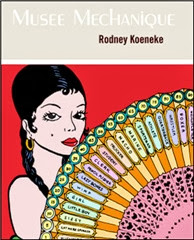Jesse Morse kicked off his reading for
Tangent a couple weekends back by magnanimously reading well-wishing emails from friends who couldn’t be there, funny ass-slapping encouragements that created a sense of occasion by wryly trying to deflate it. He followed with a cross-section of work from his vegan cookbook project which, probably like the recipes inside, tastes much better than you'd think. Morse mined the exotic, sometimes arcane vocabulary of vegan cookery for metaphors that folded relationships, consumption, and desire into one sensual interface with the world. He also read some pieces from his occasional magazine,
Pop Seance, that I described in my notes as “full-throated eco-lyricism” and have no idea now what I meant, except something good. Aliveness I guess to natural beauty, openness to love.
Sarah Anne Cox put chronology to work by reading in succession from
Arrival (written before 9/11),
Parcel (2003), and a new manuscript-in-progress called
Truancy: a micro-history of the 21st century so far. The political concerns—and even the title—of
Arrival read as anticipatory now, “dependence on the undecided” carrying over into
Parcel’s “Why, I can’t even say ‘democra …’. Cox’s mix of imagery from the contemporary and Old Testamental Holy Lands (“the burning bush with bullet-hold signage”) exposed the struts and chassis of conflict, decrying no particular occupation but rather “a condition of occupied” that gives the lie to history as bringer of ‘closure’:
“there is forward and backward
there is forward and backward
there is forward and backward
there is forward and backward
there is forward and backward
movements of a peope.”
Truancy assembled astringent odes to resistance out of snatches of schoolyard experience, the primal site of power and control, archetype maybe of all the others: “What we do here in school is certainly.” The state at the point where it intrudes on the family is the state at its most naked, and where you most want a son "with a touch of fuck-you-itis."
Dana Teen Lomax opened with work from
Curren¢y, all of whose titles are taken from words on the dollar bill. The writing centers loosely on the experience of raising a young daughter, and takes on questions about labor (particularly the kinds that don't convert easily into currency), class, and value in a witty, emotionally direct way. ("Intifada, yadda yadda ... I've got art to make.") What struck me most about the poems was their insistent political dimension, as Lomax assays the social, economic, and imperial circumstances of the world she's bringing her daughter up in, along with her hopes for its future: "skywriting a new generation,/conditions such as they are."
She followed with "super-new work" from
Shh, which she described as "all mothering poems," but not of the "these are my breasts, here is my baby" variety. Instead, the poems point to the home (
oikos) as a locus of the orders that radiate out into the polis: "Dear one, this is for certain/We work out matters on each other."
Tangent holds its readings in bars and cafes with those partially off-the-street audiences that have no idea what they're in for. Some pass by the window quizzically, peering in while pretending not to. Others come in, listen for a little, then sit down or pour back into the street. At the Press Club, a sleek wine bar with an espresso machine flanked by racks of art mags, the portion of the audience ambushed by the poetry took it in stride, even clapped once spontaneously for Jesse, and scooped up the writing from the table with a respectable vigor, as the respectable band unpacked its accordians, saws, and upright bass to play into the night.







